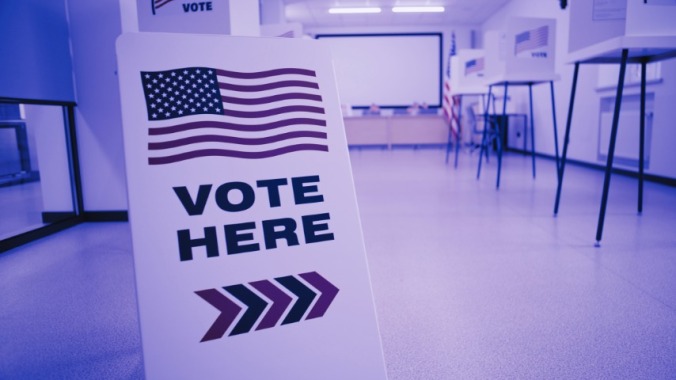Most Election Workers Are Women & Conspiracy Theories Are Endangering Their Lives
“Sometimes I’m just like, when did this happen?" one female election worker told Jezebel. "We’re on this slippery slope where not only are people becoming afraid to vote, but afraid to help people vote.”
Photo: Getty Images
As chairwoman of the Philadelphia City Commissioners, Lisa Deeley runs a bipartisan board of election workers who help facilitate free and fair elections in the city—which happens to sit in a swing state that could decide the outcome of Tuesday’s election. Deeley told Jezebel she follows in the footsteps of her mother, who was also an election worker, and has proudly participated in the democratic process since she turned 18. But everything’s changed since the last presidential election when Donald Trump convinced his base that liberal election workers across the country stole the presidency from him, and that his supporters needed to act to take their country back. Deeley recalls a barrage of harassment and threats directed at the board, which began ramping up security at the time as they watched the national climate heat up and a rash of dangerous confrontations and escalations targeting election workers across the country.
Now, Deeley says, the ballot processing center she oversees “operates in a remote warehouse where we’re contained behind a tall, metal fence, topped with barbed wire, and everyone who enters the campus has to be credentialed, with additional security inside.” All of this is new, implemented by the board in partnership with local law enforcement this election cycle. On Monday, the Guardian reported that election offices across the country have enacted similarly bold safety precautions, from drills for active shooters to bulletproof glass and steel doors, as well as de-escalation training for violent or potentially violent confrontations. Some states, including Washington and Nevada, have activated their national guards to prepare for the threat of violence and chaos.
Across the country, women make up 80% of the election workforce, according to a 2021 study from the Democracy Fund. As these women face greater security risks associated with simply doing their jobs, some see a potential gender-based violence issue arising. In May, the Brennan Center for Justice reported that 38% of election officials reported mistreatment such as threats, harassment, or other verbal abuse as part of the center’s annual poll of election workers; this is an 8% increase from the 2023 survey. The same May report showed that 27% of election workers said they know at least one fellow election worker who’s resigned over safety concerns, marking a 10% increase from 2023. Separately, a poll from 2022 found that 40% of voters worry about violent threats and intimidation at polling sites.
Unsurprisingly, 62% of respondents told the Brennan Center they’re worried about political leaders—like, say, the Republican nominee for president—trying to interfere with how election workers do their jobs. At a rally on October 27, Trump cheekily alluded to a “little secret” between him and Republican House Speaker Mike Johnson that will supposedly secure the election for Trump. Legal experts and journalists have since posited that this is a reference to how a Republican House majority could help Trump steal the election, even if he loses.
Also, in March, Trump referred to the 2024 election as “the final battle” and, back in December, called on his supporters to “guard the vote,” naming cities like Detroit, Pennsylvania, and Atlanta, which have larger populations of Black voters. Ruby Freeman and her daughter, Wandrea “Shaye Moss,” the Georgia election workers who successfully sued Rudy Giuliani for defamation, both testified in court in 2023 about the horrific, racist, sexist threats they received as a result of Giuliani and the Trump campaign’s lies about them.
Deeley told Jezebel that in 2020, at the height of Trump’s election denialism, she received 24-hour police protection. Two officers—a man and a woman—followed her everywhere; the woman officer even accompanied her into public restrooms. Every election worker Deeley knew received some police protection, she said. “Sometimes I’m just like, when did this happen?” Deeley said. “We’re on this slippery slope where not only are people becoming afraid to vote, but afraid to help people vote.”
Yes, election workers are still receiving threats. Watch this clip of Nancy Boren of Muscogee County, GA reading us a text that she got just earlier this month.
Our full @scrippsnews report on elex security updates in GA https://t.co/tCSTuPOyV4 pic.twitter.com/Ii3PrKkqDw
— Elizabeth Landers (@ElizLanders) October 30, 2024
-

-

-

-

-

-

-

-

-

-

-

-

-

-

-

-

-

-

-

-

-

-

-

-

-

-

-

-

-

-

-

-

-

-

-

-

-

-

-

-








































